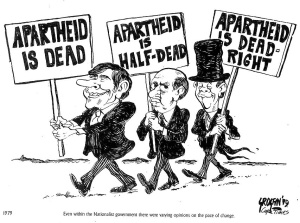For this weeks post, I read an article from Project Censored called Unfinished Revolution: Interviews with White South Africa. This title immediately grabbed my attention. I have family who live extraordinarily happy lives in Capetown, so I try to stay updated on the culture surrounding South Africa in general. This article opened my eyes. Apartheid, to me, was a horrendous occurrence that ended in the 90’s and now had museums in South Africa that I could learn about it in. My family (wealthy, white South Africans) tend to navigate away from the taboo topic whenever we have the pleasure of seeing them. When it is approached, they dance around the subject, saying what I perceive as what they think we Americans want to hear, as opposed to what is actually happening in South Africa’s present climate. This article showed that, in the year of 2014, many white South Africans wish apartheid still existed. I was in awe. The Civil Rights Movement was such a staple from my history class. Of course, I am not completely naieve. I understand that people in America still wish that segregation occurred, but it is so frowned upon to mention. The people in these articles were casually laughing and drinking tea as they blatantly wished for separation from “the blacks.”
In my opinion, an article such as this needs to be headline news. How can the world ever attempt to be at peace if we cannot realize that every person born into it is completely and utterly equal in every way? While global peace is reflects an idealistic society, many people worldwide dream of a day when war is no longer necessary. From what I read in this article, that will never happen until we are all on the same ground. Justifying separation as “separate but equal” is not ok. Separate automatically means they cannot be equal, or they would not be separate. This type of ignorance and bigotry needs to be addressed. Granted, the people interviewed grew up in the era of apartheid, so it is all they know. That, right there, is a public cry for help. If middle aged men and women only know a life of segregation as the norm, then society as a whole needs to be fixed, and other countries cannot sit idly by and do nothing. 

Having traveled to South Africa this summer I found your post intriguing. I like how you point out there are people who wish segregation still existed because it is something that never gets mentioned. However, for people to be laughing and drinking tea while wishing for separation from the blacks is inexcusable. Equality is something many countries are trying to achieve, but if people are going to act so ignorantly it is going to be impossible.
LikeLike
There are so many instances of inequality in the world that none of them receive the attention they deserve. Many people believe that apartheid is a thing of the past, but this article makes it clear how prevalent it still is. What can we do to promote equal rights in all countries? Will more articles like this help us realize the magnitude of this issue?
LikeLike
Like Joe, I recently traveled to South Africa. I had the opportunity to spend time with some locals and see the areas where the rich live and the areas where the poor live. Those two places are certainly not equal. I agree with the assertion in the post that this should be front page news. Yet, would that change anything?
LikeLike
Do you know whether this topic has reached the mainstream media? Is it only when a dramatic event has occurred that we focus on these such issues? How can we better shed light on issues that still remain after the era of attention that they will receive?
LikeLike
Good point, Nicole. It seems that the only way for these types of issues to reach mainstream media is to happen on U.S soil or for there to be an act of violence. Maybe if more stories like this reached mainstream media before an incidence of violence stemming from hate occurs, violence could be reduced or even prevented.
LikeLike
I agree with everything you all said. Apartheid was revisited after the death of Nelson Mandela because of his monumental contributions to ending it, but it seems to be out of the limelight for now. I think if articles like this had more of a presence in mainstream news then apartheid, and attitudes toward apartheid, would have to change.
LikeLike
“The people who grew up in apartheid” are also the same ones who overthrew it. My point is while some allowance for life experience is good for empathy, I am not sure it is an excuse to cling to corrupt systems or institutions.
LikeLike
No, not everyone is “equal” in terms of income, ability, skill, interests,power, and so on. But maybe we should be equally free from police abuse, or free trials. And maybe we should be equally free to make the most of our gifts. But that is not the same as “everyone is equal” if you mean equally receiving the same goods.
LikeLike
Pingback: New York Times | Stakeholder13Friday·